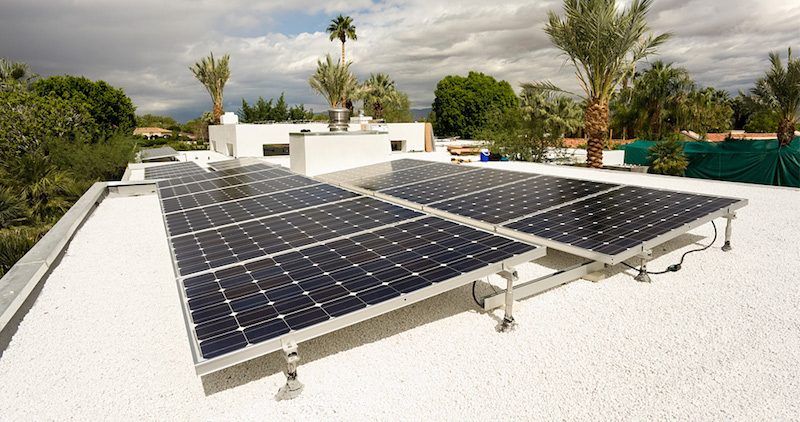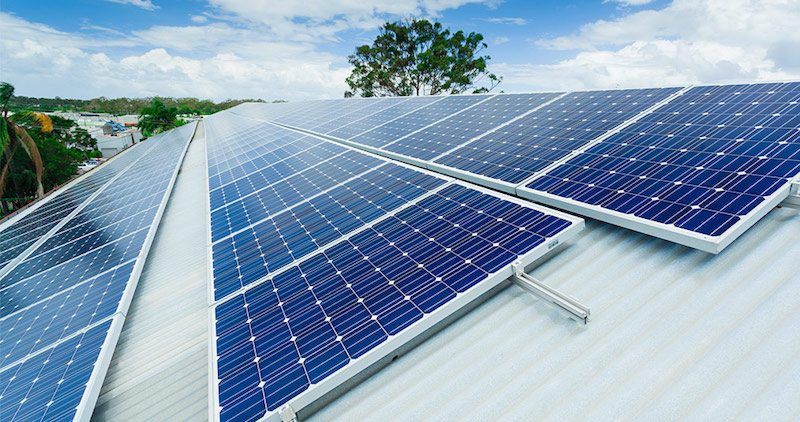Solar panels are a fairly low-maintenance investment. These systems are designed to endure the elements and are mostly self cleaning. Even so, regularly scheduled cleaning is important to keep your panels working effectively.
Though you might be tempted to maintain your solar panels all on your own, there are risks involved. If you don’t understand why, when, and how to properly clean and care for your panels, taking a DIY approach can be dangerous and costly.
Calling a trusted solar panel company to do the cleaning is always the safest, most effective option.
Why Do I Need To Clean My Solar Panels?
In order to understand why you need to clean your solar panels, you first need to know how a solar panel system works. Here’s a quick overview.

How Solar Panels Work
Solar panels are made up of cells containing semiconductors. When sunlight his these cells, the electrons begin to move, creating energy. This energy is then harnessed as electricity for your home.
Since it’s our Southern California sunlight hitting the panels which initiates this process, clean panels are important. A dirty panel means cells cannot receive the optimal amount of sunlight and, in turn, are unable to produce the same level of energy.
Keeping your solar panels clean will ensure they can do their job and make your home more energy efficient.
When Should I Clean My Solar Panels?
Here at Inter Faith Electric & Solar, we recommend you clean your panels 2 or 3 times every year. A good rule of thumb is to inspect and clean your panels once every spring and fall.
Throughout the year, airborne particles like pollen and dust, plant residue, bird feces, and dirt will collect on your solar panels. Natural occurrences like storms or strong winds will increase this buildup.
While rainfall, although infrequent here in Southern California, can help naturally wash away grime, it can’t completely scrub them clean.

Signs Your Solar Panels Need to Be Cleaned
Aside from your regularly scheduled spring and fall cleanings, it’s a good idea to keep an eye on your panels throughout the year. Set a calendar reminder to check your solar panels seasonally to ensure everything’s working as it should.
Here are a few things you should look for:
- Higher monthly electricity bills
- A dip in the wattage generated by your panels
- Visibly dirty panels
How Do I Clean My Solar Panels?
As we mentioned earlier, cleaning your panels is involved and can be dangerous if you’re not a professional. Here’s how the process works:
- First, you need to understand the specific requirements or warnings related to your solar panel manufacturer. For example, some panels may require you to power down before cleaning, to ensure safety.
- Then, you’ll need to find a way to work safely on your roof. It’s best to choose a day with cloud coverage, otherwise your cleaning water will evaporate too fast and leave marks on your panels.
- Using clean water, a sponge, and small circular motions, you’ll scrub the panels to remove build up. Afterwards, rinse with water.
- Difficult stains may require a gentle cleanser, such as dish soap. Never use harsh chemical-filled cleaning supplies, abrasive scrubbers, or power washers. These can permanently damage your panels.
Depending on how many panels you have, and how dirty your panels are, this ordeal can be labor intensive and time-consuming for the inexperienced. For this reason, many homeowners choose to call a professional solar panel contractor to help with this process.
Risks of Cleaning Your Solar Panels On Your Own
Aside from all the time and energy you’ll spend doing this cleaning project on your own, there are several glaring risks involved.
Falling From Your Roof
Consider this: falling accounts for almost 40% of all deaths within the construction industry– and these are trained professionals! The truth is, attempting any work on your roof, whether it’s cleaning solar panels or working on electrical issues, is dangerous. Don’t take the risk!
Damaging Your Panels
Like we mentioned above, it’s possible to damage your solar panels by not cleaning them correctly. You can’t simply jump up on your roof and start scrubbing. There are a number of important factors coming into play here, including:
- Where your solar panels were made
- The type of cleaning solution
- The type of scrubber/cloth
- Your cleaning technique
- The temperature of water you use
Additionally, every time you’re up on your roof, you run the risk of damaging your roof itself!
Failing to Clean Your Panels Properly
Even if you manage to clean your panels without damaging their integrity, there’s always the risk of not doing the job well. Whether it’s streak marks left on your panels, leaving residue on your panels, or simply not getting the entire surface area cleaned, it’s easy to do the job poorly.

How A Solar Contractor Helps
When it comes to cleaning and maintaining your solar panels, a trusted local-area solar contractor is the best option.
A professional will understand the needs of your particular panels and have the experience and ability to work safely and efficiently. Most importantly, a solar contract will protect your investment and won’t damage your roof.
Beyond doing the job safely and correctly, hiring a solar contractor to clean your panels is also a chance to have them inspected for any issues. Though solar panels are very durable, resistant to rust, and and are built to last, regular eyes-on inspections can be beneficial.
If your solar panels were installed by a reputable company, they’ll come with a warranty you can use if an issue does ever pop up.
Ready To Get Your Solar Panels Cleaned?
When’s the last time you had your solar panels cleaned? Do they need some love and attention?
Here at Inter Faith Electric & Solar, we believe regular cleanings are the best way to protect your investment. We want to help make it easy for Southern California residents to maintain their solar panels, so we offer expert solar system cleanings for just $5 a panel!
Whether you have questions about how best to take care of your panels or are ready to schedule a cleaning, we’re happy to help. Contact us today!







Leave A Comment